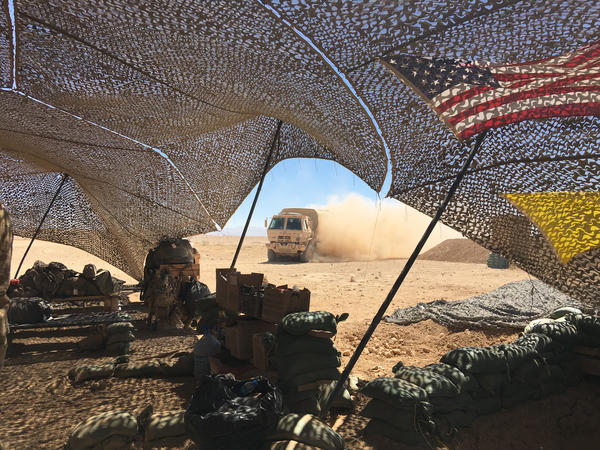- Joined
- Apr 18, 2013
- Messages
- 94,343
- Reaction score
- 82,727
- Location
- Barsoom
- Gender
- Male
- Political Leaning
- Independent
From Deep In The Iraqi Desert, A New U.S. Fire Base Targets ISIS In Syria

I've always appreciated artillery cover. Those arty dudes can really save your ass.

As U.S. military bases go, Um Jurius isn't much to look at: a collection of armored vehicles, makeshift wooden benches covered with camouflage netting and groups of tents pitched in the sand. 3The fire base has sprung up in the past month in the northern Iraqi desert, just over a mile from the Syrian border. At the request of the Iraqi government, U.S. artillery here targets ISIS fighters who have fled from Iraq to Syria. "They're pursuing any ISIS elements so they can't regroup and present a threat," Maj. Gen. Walter Piatt says of the Iraqi and Syrian forces the U.S. is backing. To reach the base, Black Hawk helicopters leave from another U.S. military base in Irbil, the Iraqi Kurdish capital, and fly over Mosul, the Iraqi city where ISIS declared a caliphate four years ago and intended to erase the borders of Iraq and Syria. Last year, Iraqi forces drove ISIS out of Mosul, after nine months of what U.S. commanders described as the fiercest urban warfare since World War II. The helicopters fly along Mount Sinjar, straddling Iraq and Syria, where hundreds of thousands of Yazidis fled four years ago to try to escape ISIS genocide. An hour later, as the choppers land in the desert at Um Jurius, they kick up a pale, fine-grained sand that hangs in the air and settles like powder. "We've been out 27 days and we've shot about 30 times out here — most of it is terrain denial," says Powell, referring to blowing up avenues of approach such as bridges or other territory to prevent ISIS from re-entering. The U.S. military says it takes care to avoid civilian casualties. The field artillery soldiers never see the targets they are firing at, more than 10 miles away. It's the first deployment for many of these soldiers.
"You train, train, train, and then you actually get to do some combat — that's priceless experience," says Lt. Aaron Palumbo, a platoon leader from Orlando, Fla. As Piatt walks around, Iraqi soldiers and officers who share the base stop to take selfies and other photos with him. "The fight against ISIS is almost finished, but there are still pockets of them," says Iraqi Col. Mohammed Abed. "We are helping the Syrian Democratic Forces because the same terrorists are in Syria and Iraq." U.S. Marines from the 3rd Battalion 7th Marine Regiment protect the base and are responsible for maintaining contact with other security forces in the area. On the Marine side of the base, a few paperbacks lie on a homemade wooden table. Lt. Paul Brown, from Palo Alto, Calif., is reading The Power of Habit, to learn tips on operating more efficiently. "We've made this place a home, so we're very happy with what we've built," says Powell, 27, pointing to showers and a water cooler they've rigged up. There are scorpions here, and flesh-eating camel spiders the size of a human hand that get into the tents at night. There is no air conditioning. The troops don't seem to mind. "It's very, very hot — I'd say about 110, but it cools off to the 80s or 90s at night," says Powell. "At night, you can really see all the stars." And the American soldiers and Marines meet to play their own form of baseball. It's likely what they'll do on the Fourth of July. "We got a few baseballs out here and we take the handle from a pickaxe and set bases up and have a good time," says Army Pvt. Clayton Mogensen, 22. "It boosts morale when we're not training."
I've always appreciated artillery cover. Those arty dudes can really save your ass.
